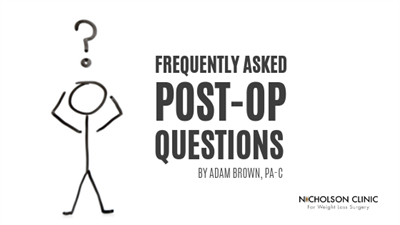
By Adam Brown, PA-C
If you are scheduled for or have already had bariatric surgery, it is normal to have questions about what to expect after surgery. While each patient’s experience can vary, there are some common questions we get asked by patients after surgery. Here are five of the most common frequently asked bariatric post-op questions.
- Why do I have nausea and vomiting after surgery?
Immediately after surgery you may experience some nausea due to the anesthesia and/or pain. Stapling across the stomach will naturally create a level of nausea. However, these are typically short-lived and you will receive anti-nausea and pain medications right away to help eliminate discomfort or nausea immediately after surgery.
In the first few weeks after surgery you may experience some waves of nausea due to a lack of protein intake and dehydration. Patients are required to drink at least 64 ounces of water and consume 60 grams or more of protein daily. Sometimes this can become a vicious cycle: patients may be nauseous and not want to drink their protein shakes, but then the lack of nutritional intake makes them more nauseous.
The best thing patients can do is take anti-nausea medication as recommended and do whatever it takes to ensure all nutritional and hydration conditions are met. This will optimize weight loss, give you strength and energy, help you heal faster, and keep you out of the emergency room.
- How do I ensure I’m getting enough hydration/nutrition?
Many of our patients don’t experience any nausea or vomiting and are able to consume water and protein with no problem. For others, this is a challenge.
The best advice I give my patients is to dilute their protein shakes and water together to make it more tolerable. This takes care of the concentration in protein shakes, helping with the consistency, taste, and smell, making them far more palatable.
I also encourage changing protein brands. All protein shakes taste different from one another and some are better than others. Find a protein brand you can tolerate. You may have to try several different brands before finding the right one.
For variety, we recommend changing protein flavors—chocolate, vanilla, strawberry, or even flavorless—and types—whey, dairy, plant-based, egg white. This will help combat taste fatigue (getting tired of the same taste over and over again). Bone broths fortified with protein are another option and have more protein per serving compared to standard chicken, turkey and beef broths.
- What kind of vitamins should I be taking?
Nicholson Clinic recommends Bariatric Advantage vitamin packs for our patients. These vitamin packs are specifically designed for and made with bariatric patients in mind.
However, there are other vitamin options to choose from. The key is to make sure you are getting all the necessary vitamins you need after bariatric surgery. We do not recommend Flintstone vitamins or gummy vitamins as these typically do not have sufficient levels of everything bariatric patients need after surgery. Gummy vitamins may also contain artificial sugars, which may not be beneficial to metabolic health.
Some more tolerable forms of vitamins our patients use include liquid forms, or even chewables. Pills can upset any stomach, let alone a stomach after bariatric surgery.
Remember, patients are not required to take vitamins until two weeks post-op.
Refer to your bariatric packet, or our website, for exact vitamin specifications.
- Should I focus more on my diet or exercise?
Short answer: both. Everyone should be exercising at least 150 minutes per week, while maintaining a healthy, well-balanced diet. Your diet should be high in various proteins, colorful whole fruits and vegetables containing plenty of fiber and healthy fat sources.
However, when it comes to obesity medicine, we now know a lot more with respect to the roles exercise and diet play in weight loss. What you eat contributes to 80 percent or more of weight loss. If the diet is off, not even intense exercise can correct excess fat storage in the body.
Moreover, we know that the most important thing to consider in your diet is exactly you are eating, with the second most important thing being how much you are consuming (volume per sitting and overall caloric intake).
Focus on reprioritizing proteins such as meats, dairy products, legumes and nuts as your top fuel source, with plenty of whole fruits and veggies as the second-most common food consumed. Consume healthy fats such as avocados, almonds, and flaxseeds, and avoid excess carbohydrates and sugars such as pastas, breads, rice and white potatoes.
Keep in mind that your body needs some carbs and sugars, but you can get this naturally from whole fruits and vegetables. If you keep your protein high, the carbs and sugars you consume will generally fall in place.
And never drink your food. This means no juices, shakes or smoothies. Also no easy liquid calories such as sodas, sweet teas, lemonades and excessive alcohol. Before you know it, you’ll consume the recommended daily calorie intake before lunchtime.
- How do I prevent my new stomach from stretching out over time?
The key to preventing your new stomach from stretching is to adhere to the medical diet as discussed above. Diets that are high in excess carbohydrates and sugars tend to have a lower satiety index, or feeling of fullness, compared to proteins, whole fruits and veggies and healthy fats.
It can be easy to overindulge on overly processed, heavily starchy, calorie-dense foods because they are less filling. These foods can also be addictive. Consuming these foods can be a slippery slope leading back into bad habits and slowly stretching the stomach to account for larger volumes of food consumed during meals. Sugars, carbs and starchy foods are also easy for your body to store as fat for later energy expenditure whereas proteins and fiber-rich foods target excess fat storage.
Bottom line: keep your protein levels high and eat plenty of colorful, fiber-rich fruits and vegetables (and a nice variety of both throughout the week), with a good serving of healthy fat sources in order to stay fuller longer, burn more calories during normal digestion and specifically target excess body fat stores.
About the Author
Adam Brown is a nationally certified, state licensed Physician Assistant for the Nicholson Clinic. He helps assist the bariatric doctors in surgery, sees patients for pre-op and post-op care, interprets labs and imaging, and provides the latest evidence-based patient education available.












